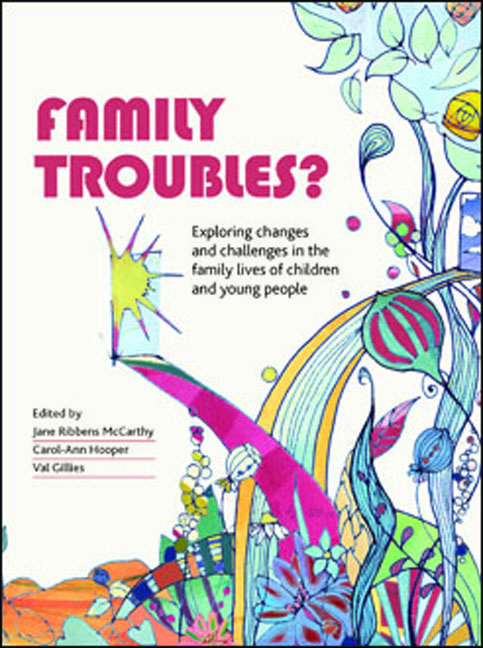Book contents
- Frontmatter
- Contents
- Notes on contributors
- Foreword
- Preface
- 1 Troubling normalities and normal family troubles: diversities, experiences and tensions
- Part One Approaching family troubles ? Contexts and methodologies :Introduction to Part One
- Part Two Whose trouble ? Conteste d definitions and practice: Introduction to Part Two
- Part Three The Normal, The Troubling And The Harmful?: Introduction to Part Three
- Part Four Troubles and transitions across space and culture: Introduction to Part Four
- Part Five Working With Families: Introduction to Part Five
- Index
12 - The permeating presence of past domestic and familial violence: “So like I’d never let anyone hit me but I’ve hit them, and I shouldn’t have done”
Published online by Cambridge University Press: 07 September 2022
- Frontmatter
- Contents
- Notes on contributors
- Foreword
- Preface
- 1 Troubling normalities and normal family troubles: diversities, experiences and tensions
- Part One Approaching family troubles ? Contexts and methodologies :Introduction to Part One
- Part Two Whose trouble ? Conteste d definitions and practice: Introduction to Part Two
- Part Three The Normal, The Troubling And The Harmful?: Introduction to Part Three
- Part Four Troubles and transitions across space and culture: Introduction to Part Four
- Part Five Working With Families: Introduction to Part Five
- Index
Summary
Introduction
As de Beauvoir (1949) argues, for women, the future is often haunted by phantoms of the past, which impact upon the present. This chapter draws on one woman's narrative journey from childhood to motherhood, examining how ‘troubles’ feature in her life in the form of domestic and familial abuse. Specifically, the permeating nature of ‘trouble’ is demonstrated in her ideas of what she might become and what she is afraid of becoming; and while she recognises abuse as a harm to be avoided if possible, and/or repaired, it is also routinely normalised in her account.
In the Introduction to Part Three, Hooper established the ways in which domestic abuse remains an insidious presence in the darker side of family life. Domestic abuse has a substantial financial cost to the economy (Walby, 2004) and such violence can also disrupt typical developmental trajectories through psychobiological effects, post-traumatic stress disorder and cognitive consequences (Margolin and Gordis, 2000; Jarvinen at al, 2008).
Violence was not my initial research focus; nonetheless, as Rock (2007, p 30) contends, there is a ‘need to remain open to the features that cannot be listed in advance of the study’, and this family trouble was an invasive element in the construction of femininity (see Mannay, 2011). The normalisation of male violence was central in the participants’ accounts, where masculinity was tied to aggression and male violence was naturalised.
Adult recollections of violence in childhood supported Henriques et al's (1998) contention that the question of who we are is tied to the memory of who we have been and the imagination of what we might become. In this way, male violence had a pervasive hold over the participants, permeating their everyday lives and aspirations, becoming normalised, and engendering intergenerational journeys that threaten to impinge on their daughters’ trajectories.
The study
The data were drawn from a wider research project that employed visual and narrative methods of data production to explore the experiences of mothers and daughters residing on a marginalised housing estate. The research focused on the ways in which the boundaries of the immediate culture and memories of the past mediate their educational and employment histories and futures.
- Type
- Chapter
- Information
- Family Troubles?Exploring Changes and Challenges in the Family Lives of Children and Young People, pp. 151 - 162Publisher: Bristol University PressPrint publication year: 2013



